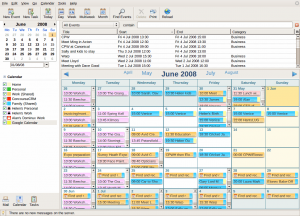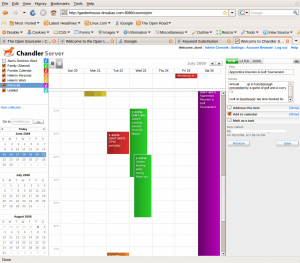Migrating from Windows
The last Windows computer in our house is very shortly going to be history 🙂
I have been threatening my wife’s PC for quite some time now, but there has been no real motivation to move until today… Our bank called and told her a credit card has been fraudulently used in the last few days. Fortunately they appear to have correctly and swiftly identified the misuse and are dealing with the problem.
However, this experience has obviously caused my beloved (Helen) to start wondering how her details were captured in the first place. She is pretty scrupulous with the shredder, and this particular card is almost only ever used for on-line transactions; so her PC was a possible, if not likely, route for the thieves. The ClamWin AV scan threw up a few nasty sounding files, including some IE.IFrame trojan thing, although they had all been quarantined already. But the fact that Windows is so vulnerable to attack and subsequent compromise when compared to Linux, this saga has just tipped the scales. We now have a good reason to start the final migration of the Lord household.
This evening, I have installed Thunderbird on Helen’s Windows PC and imported everything from her Outlook email client. The import was basically flawless and after changing a few settings she’s now up and running with TB. (Interestingly, her first few comments were very positive: “This looks nice”, “It’s much faster”, “I like the address book layout” and so forth.) I added Lightning and connected her up to our caldav Calendar Server (Cosmo) which is an added bonus for Helen. We all use this for work, family and personal scheduling and Helen had been limited to using web access (simply because Outlook doesn’t support the Caldav standard) which is not the optimum interface to this calendar.
Helen was already using Firefox most of the time but now I’ve asked her to stop using IE altogether.
Helen also has OpenOfice.org (OOo) installed already but has not been using it much as the Windows defaults are [were] set for MSO 2003. This will probably be the area where there will be some new learning as she stops using MSO and starts using OOo but it isn’t that painful to be frank.
I think within a month, I will install Ubuntu 8.10 as a dual boot for a short period just in case she finds there are things that don’t work and then we’ll turn off the malware-that-pretends-to-be-an-OS Windows within a few weeks from then.
She does use iTunes for her work and pleasure so I am thinking we’ll need to have a VM (VirtualBox) running her copy of XP to support that, unless someone would like to offer advice on alternatives. She runs music therapy classes and her material is ripped onto her iPod using Apple’s lossless codec IIRC that iTunes seems to default to. Never having used it myself, nor do I own an iPod I am not the best source of advice on this one so if anyone can help here I’d be grateful.
I can’t think there is much else that will bite us though; she doesn’t have any other proprietary apps I can see that are going to prove troublesome to replace.
One thing that is really important in this story is this ability to run the main applications: Firefox, Thunderbird and OpenOffice.org, on both Windows and Linux platforms. It will make the transition, for a non-technical user, much less painful than having to switch wholesale over to new apps and a new OS all at the same time. Thanks Mozilla and OOo.
As we go through this migration I’ll write a little more (I might even ask Helen to document her experiences and thoughts). Hopefully it will help others doing, or wanting to do, the same thing.
Chandler Calendar Server (Cosmo) 1.0 Released
Now here’s a great OSS tool that seems to get less attention than it is due. Congratulations to the chaps at the OSAF on getting the 1.0 release out. It’s a great product.
We’ve been using this calendar server for quite a while now and without any incidents, failures or operational problems. I shall probably upgrade it to the 1.0 in a short while, but seeing how reliable our 0.13svn system has been I’m a bit reticent – you know the old adage; “if it ain’t broke, don’t fix it!”.
So, what’s a calendar server then?
Think of google calendar or something similar that allows you run multiple calendars and decide who gets to see what bits of your life story.
Cosmo is one of these. It supports various communications methods including the public IETF standard CalDAV protocol to talk to calendaring clients (iCal, Sunbird, Lightning…) and it also has a built-in web interface so you can access your calendar when away from your desk/laptop computers.
The neat thing about the way Cosmo works is the way you manage and publish your separate calendars (called collections). You issue tickets that can be everlasting or time-limited and can provide full read/write access, read-only access or just show free/busy status, and you can send these tickets to as many people as you like – no need for creating accounts and passwords for the recipients.
Here’s a screenshot of Mozilla Thunderbird using the Lightning (calendaring) plugin. All the data is resident on our Chandler calendar server and is accessed via the CalDAV protocol.
The list down the left shows the various calendar collections to which I have access and the main screen shows all the events and tasks color coded for the month of June.
Here’s a similar shot but of the Cosmo UI in a web browser.
Cosmo is a Java application that runs in a Tomcat server. We have ours running on my little low power VIA C7N server and it has been running happily for a year or so with no interruption to service.
Interestingly, Google has just made available a CalDAV interface to their calendar system too. It is a bit rough around the edges currently and is only supposed to support Apple’s iCal client but thanks to a comment from Roberto via the cosmo mailing list, I made a brief test with Lightning using CalDAV and it appears to work O.K. But don’t take my word for it: in Sunbird or Lightning, use the following URL to talk to your Google calendar:
https://www.google.com/calendar/dav/UserName@gmail.com/events
It’s alright, although managing multiple collections, or calendars, with Google is no where near as easy as it is using Cosmo. But being able to now collate all your calendars into your desktop with Lightning and CalDAV is great!




